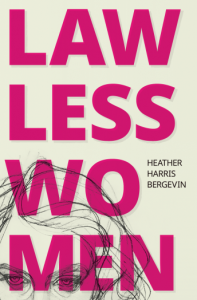Title: Lawless Women
Author: Heather Harris Bergevin
Publisher: BCC Press
Genre: Poetry collection
Year Published: 2018
Reviewed by Chad Curtis
I ran into this book on a blog post at By Common Consent. BCC always has great content that gets you thinking. You may not agree with every post, but they all have something of value to add, and the tone is always respectful. The book is a selection of poems from an LDS mother, student, and feminist.
Some of the poems make you a little uncomfortable. But I think that is a place we as members need to be more often that we allow ourselves. What is that phrase that we throw around at stake conferences and youth meetings? “There is no comfort in your growth zone, and no growth in your comfort zone.”
Each poem deals with a variety of perspectives– from the author’s own experience as a parent, from a fairly tale character, or from a woman in the Bible. These characters tend to be overlooked or forgotten. One of the opening poems deals with Vashti, the wife of the king of Persia in the story of Esther who refused to come to the king when he called. Other characters include Wendy from Peter Pan, Gothel from Rapunzel, and the queen from Snow White. The genre of literature that tells the story from the character traditionally portrayed as a villain is very well done here– think Disney’s Maleficent or the TV series Once Upon a Time. In her introduction, the poet explains her motivation for writing these: “Why is any woman educated in a monastery suddenly suspected of wizardly and seen as dangerous? Why were the stepmothers and queens always evil? Does history originate from and get written about only one gender?”
The author’s poetry is absolutely beautiful. They are written in open form, meaning that there isn’t a set structure of stanzas or rhyming or rhythm schemes. What makes them poetry for me is what is left unwritten, what is open to interpretation, that, like a human being, you can’t expect to know everything about the poem, because it is complex. Some poems require the reader to have some background knowledge (I didn’t know about the La Belle Dame by John Keats, for instance). Many poems wouldn’t make sense if you didn’t read the title first. She also uses several techniques in her poems that I found charming:
* She uses parentheses to indicate two different words that change the meaning of the line e.g. fair(l)y, unlo(i)ved, and (de)scribe. Germans are really good at this, and do it all the time in book titles and more (Bis(s) zum Abendgrauen is the title of Twilight).
* She shoves words together into one word (again, a German thing! I wonder if it’s a coincidence) to make new ones e.g. horrorugliness, sparklingcrisp, editrevisedouble and check.
* She uses alliteration in lists of words e.g. unpresidented, unprecedented, unpredicatable. Just so good!
This is a great collection of poems! Highly recommend this read.

